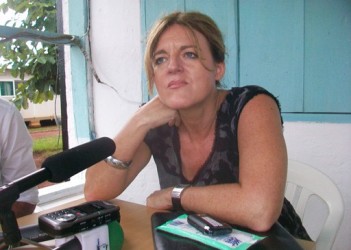Political parties inclusion vital for South Sudan’s democracy say UN
July 18, 2012 (JUBA) – South Sudan’s Special Representative to the United Nations Secretary General on Tuesday stressed the importance of political parties inclusion in governance; describing it as a basic principle for democracy in the world’s newest nation.

“We think political parties are very important for any inclusive governance,” Johnson told a brief press conference held in Yambio, the Western Equatoria state capital, shortly after she held closed door meetings with the governor, members of the African Union task force, civil society and political party representatives.
Johnson, who often referred to Western Equatoria as one of the “most peaceful” states in the country said she was equally impressed with the decision by the governor, Joseph Bakosoro to appoint an inclusive government in this recent cabinet, reportedly comprising of members from the other political parties and groups.
Acknowledging the food insecurity problems in the new nation, Johnson urged the population in the state, known as the bread basket of the country, to focus on surplus food production so that the excesses can be exported for income generation.
“Western Equatoria state has the most fertile areas with huge potential for agriculture and given the significant food security problem in South Sudan, where most people depend on aid, there is need to focus on surplus food production,” she noted.
At least 4.7 million South Sudanese, according to a United Nations (UN) food security assessment remain food insecure this year, with about one million reportedly at risk of facing hunger in the country.
The special envoy also pledged to support agriculture in the region by encouraging other development partners to extend assistance to the country.
During her brief visit, which was earlier interrupted by severe weather conditions, the special envoy also held talks with the Uganda People’s Defence Forces (UPDF) commander of operation ‘lightening thunder’ and members of the United States special forces, who are currently in the region as part of the mission to end the Lord’s Resistance Army (LRA) insurgency.
Johnson further pledged the full cooperation of the UN Mission in South Sudan (UNMISS) in various aspects with the different forces involved in the anti-LRA campaign, who during their meeting, highlighted several challenges in their efforts to set up modalities for their operation.
Meanwhile, the state governor expressed a lot of dissatisfaction with the AU forces deployed in the region who, he told journalists, have done very little in their mandate on the LRA problem in the state.
“The mandate of the AU forces was to use force against the LRA, but up to now, they have not yet started, which is a challenge to them,” Bakosoro said, partly putting the blame on inadequate funding and failure by the different forces to gather in one place.
He could not, however, elaborate on the exact numbers of the forces already deployed in the region as part of the campaign to hunt down the elusive LRA leader.
(ST)
